May 2, 2024 | 19:24 GMT +7
May 2, 2024 | 19:24 GMT +7
Hotline: 0913.378.918
May 2, 2024 | 19:24 GMT +7
Hotline: 0913.378.918
Editorial Board's words: To establish green agriculture, biological pesticides serve as a model for both safe and effective production and for the "nurture" of the ecosystem. However, implementing the strategy will require not only the involvement of the plant protection sector but also the determination and engagement of the entire community through responsible acts.
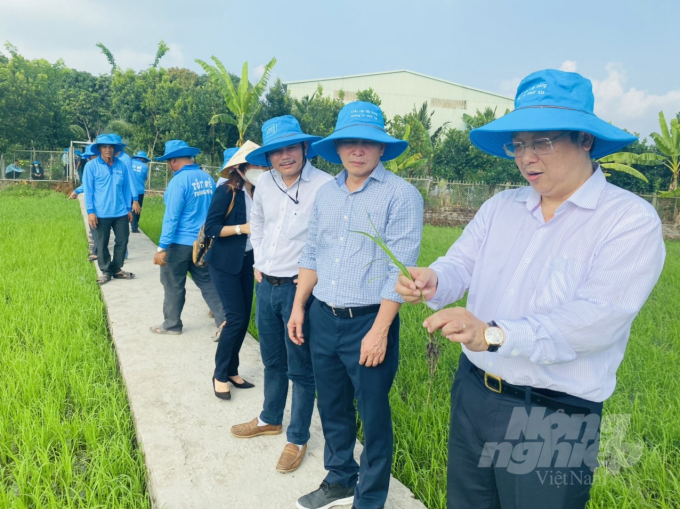
Mr. Hoang Trung (right cover), Director of the Plant Protection Department talked about the benefits of applying biological pesticides to rice. Photo: Le Hoang Vu.
Mr. Hoang Trung, Director of the Plant Protection Department, led a working group of the unit in meeting and supervising the demonstration of biological pesticides on fields performed by Tan Thanh Commerce and farmers in Thoi Xuan commune, Co Do district (Can Tho city).
Mr. Nguyen Truong Thu, Sales Director of Nam Song Hau (Tan Thanh Business), stated that the company conducted tests and field surveys to implement the "Biological Power" process on hundreds of modeling fields around the Mekong Delta area.
Through practical experience, the "Biological power" process has produced positive results, including lowering cultivation costs on the field, increasing rice output, and most importantly, having no adverse effect on farmer health, reducing pesticide residues on finished products, being safe for consumers, and being environmentally friendly.
Tan Thanh, according to Mr. Thu, is a pioneer in the Vietnamese plant protection agent business, having created a variety of biological pesticide products for farmers. Tan Thanh has deployed display models of biological pesticides in a variety of crops in several Mekong Delta areas over the last few years, and the results have been lauded by farmers.
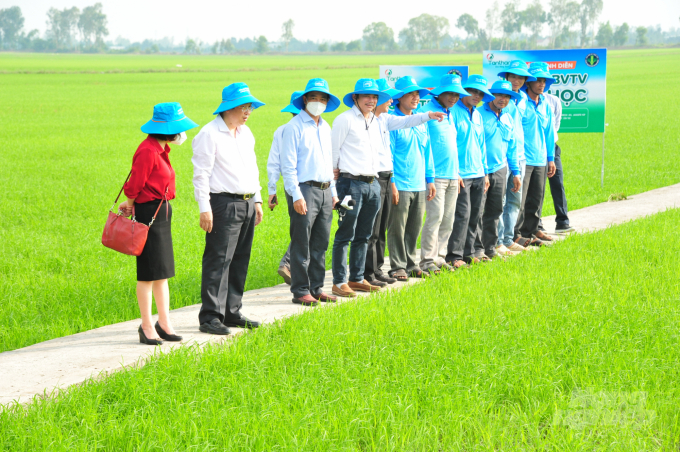
The delegation of the Plant Protection Department, representatives of Tan Thanh Company, and farmers visited biological fields in Thoi Xuan commune, Co Do district (Can Tho city). Photo: Minh Dam.
Tan Thanh has developed a demonstration program on 136ha for the winter-spring crop of 2021-2022. The approach is being displayed again in the 2022 summer-autumn crop, when the rice plants have begun to branch, creating a spectacular picture.
Mr. Nguyen Van Nhieu, a rice farmer with over two decades of experience in Thoi Xuan commune, Co Do district (Can Tho city), shared: "Biological pesticides have a gradual effect, but chemical pesticides have a clear and immediate effect. Certain individuals who are closely engaged in biological pesticides have a tendency to foresee sickness and plan possible prevention actions to maximize the pesticide's effectiveness. While some leave the crop untreated, enabling pests and diseases to spread and cause harm, biological pesticides have minimal effect."
Mr. Nhieu initially used chemical pesticides to kill snails and sprouts; however, once the rice reaches day 45, he completely switches to biological pesticides to help the root grow deeper, avoid plant collapse, reduce pest, and care, and reduce the cost of the crop by 15-20 percent when compared to chemical pesticides.
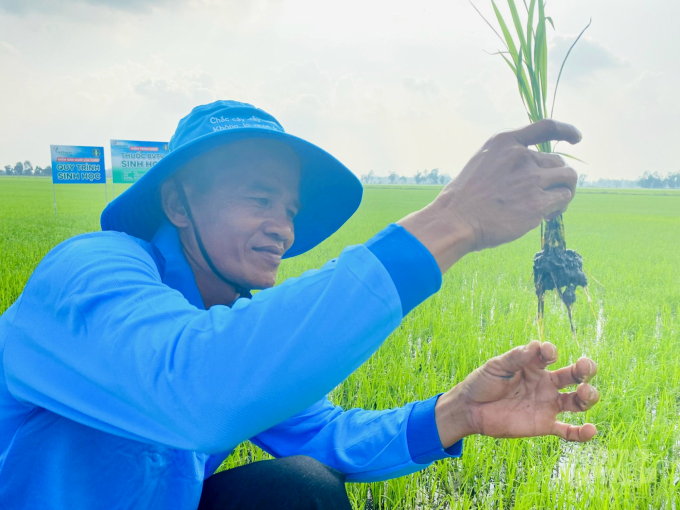
Farmers using biological pesticides are always assured of protecting the health and the community, reducing costs, and increasing yields. Photo: Le Hoang Vu.
And Mr. Nguyen Thanh Thuc, a farmer in E1 hamlet, Thanh An commune, Vinh Thanh district (Can Tho city), who cultivates 7 hectares of rice, stated that the Tan Thanh Company's "Biological power" process is well-known to farmers and trusted by a large number of people in the region. Indeed, with over ten rice crops planted since the process was implemented, the economic and environmental benefits are readily apparent.
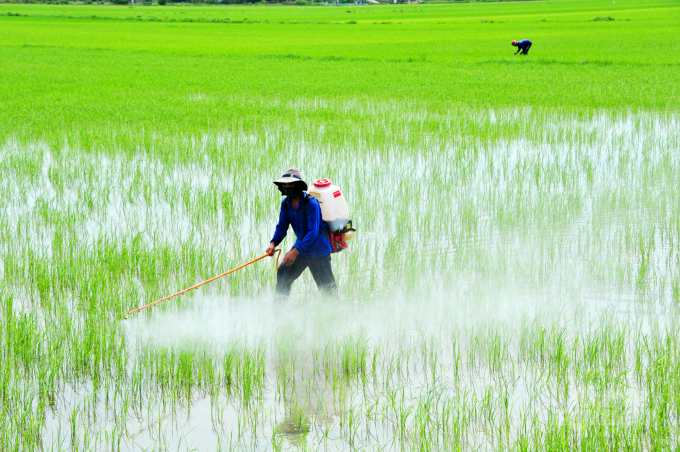
Using biological pesticides helps rice roots grow deeper, fewer collapse plants, fewer pests, easier care and helps reduce costs by 15-20%/crop compared to using chemical pesticides. Photo: Minh Dam.
"Through real recognition from a variety of production crops using the "Biological Power" process, I discovered that investment costs are cheaper than previously, rice plants are healthier, natural enemies are attracted to rice fields, and pests and illnesses are fewer. For the winter-spring crop of 2021 - 2022, the investment cost is around VND 615,000 per 1,000m2 cheaper than the rate of VND 850,000 per 1,000m2 under traditional farming. Rice yields are enhanced by an average of roughly 500 kg/ha as a result of Lacasato spraying, and the rice seeds are brilliant yellow and quicker to sell. The outcome exceeded my expectations, and as a result, I encouraged village neighbors about this process," farmer Nguyen Thanh Thuc stated.
Mr. Hoang Trung, Director of the Plant Protection Department, estimated that farmers would incur losses if they continued with traditional farming techniques in the face of the escalating price of agricultural inputs, including pesticides.
Rather than applying pesticides when pests and diseases manifest, it is better to pick appropriate kinds at the beginning. For the stage of care, even during the pest time, it is unnecessary to use pesticides since the rice plant's resilience will be enhanced, while the pests' development rate will naturally slow down.
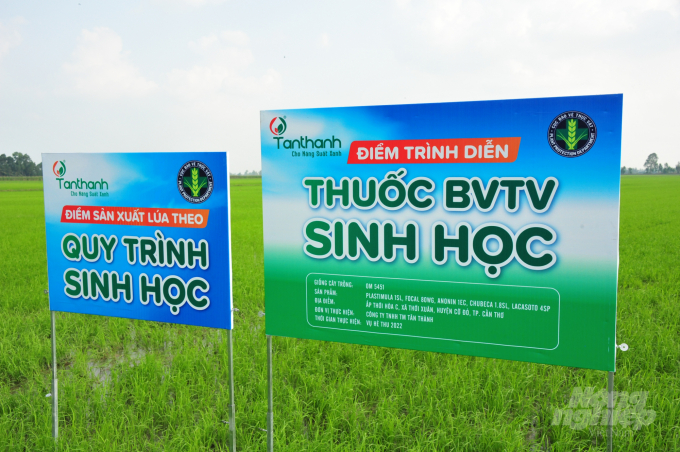
Model "Demonstrating biological pesticides on the field" of Tan Thanh Company in cooperation with farmers in Thoi Xuan commune, Co Do district (Can Tho city). Photo: Le Hoang Vu.
If farmers understand that rule, understand rice's management, and understand rice's incredible resistance when it enters the tillering stage, pesticides are no longer necessary.
According to Mr. Trung, the local and central agriculture industries have long recommended that farmers actively monitor, visit their fields regularly, and rebalance their fields' ecosystems, knowing when to use biological or chemical treatments. Additionally, the participation of specialized agencies and municipal governments is critical. To inform the public clearly and simply about the benefits of biological pesticides and organic fertilizers.
While biological pesticides and organic fertilizers may not be immediately effective, if used consistently, the benefit will be prolonged to subsequent harvests. Farmers will then reap the benefits. If the evaluation enables farmers to comprehend the benefits of biological treatments and the drawbacks of chemical drugs, they will make their own decisions about which to employ on their farms.
"In the near future, the Plant Protection Department will advise the Ministry of Agriculture and Rural Development and the Government on developing regulations to accelerate the registration and manufacture of biological pesticides in order to swiftly bring them into production service.
In the future, biological products that are proven to be beneficial in production models will be registered for use in organic agriculture. However, these goods must adhere to the active components suggested by the Plant Protection Department following extensive consultation with units, organizations, and individuals. Thus, individuals may select certain items that aid agricultural productivity. The Plant Protection Department will be responsible for evaluating and verifying which products are safe to recommend to the public.
(Mr. Hoang Trung, Director of the Department of Plant Protection)
Translated by Linh Linh
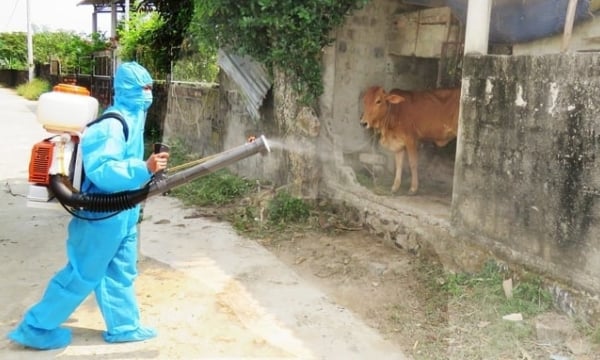
(VAN) An outbreak of Lumpy Skin Disease has occured across four districts in Quang Binh province, prompting local veterinary forces to strengthen prevention efforts.
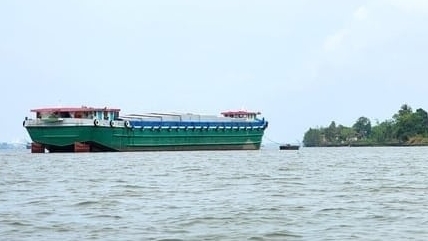
(VAN) 'There is water in the rivers and water in the sky, so why does the Mekong Delta lack water?', a problem raised by experts to find a solution for the region's water conservation story.
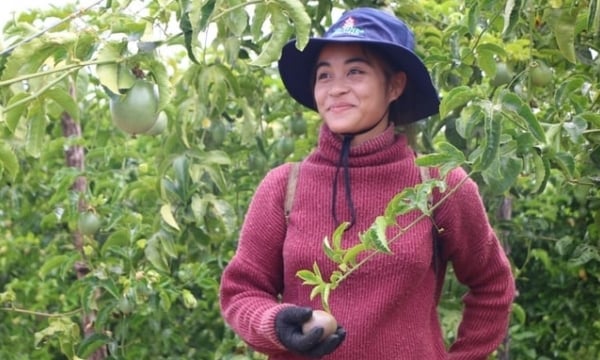
(VAN) With advantages in production area and market demand, passion fruit is emerging as a key crop in the Central Highlands, providing sustainable economic benefits for local residents.

(VAN) Large-scale irrigation projects in the Mekong Delta have safeguarded a beneficiary area spanning more than 1 million hectares, significantly mitigating damage caused by drought and saltwater intrusion.

(VAN) Residents along the south bank of the Hau River are anticipating the Rach Mop lock by the end of 2024, along with projects to fortify the irrigation system to prevent saltwater intrusion.
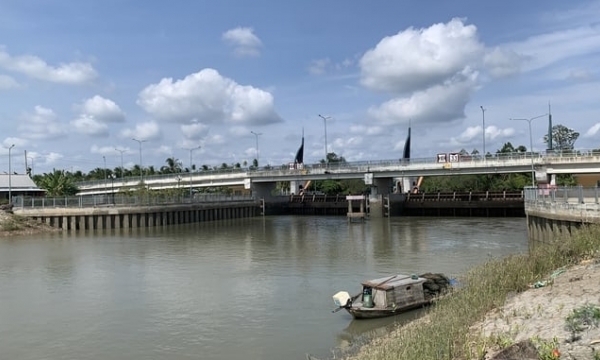
(VAN) The Bong Bot - Tan Dinh sluice delivers fresh water to meet the production demands of thousands residing in Tra Vinh province's coastal areas.
/2024/04/26/0500-3-135847_403.jpg)
(VAN) According to Dr. Dao The Anh, if indigenous varieties that are highly nutritious and adapt to climate change can be developed, the community will greatly benefit.